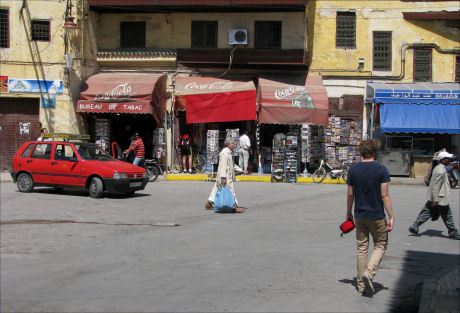Out of touch with everything except an extreme concentration on northern Morocco’s coarse and winding roads (and being careful not to hit the various cows, steers, goats, sheep and burros who graze alongside and occasionally cross them), I’ve just learned of the 62nd Cannes Film Festival jury’s decision to hand the coveted Palme d’Or to Michael Haneke‘s The White Ribbon.
You could call Ribbon a bit stern and frosty, but it’s got a river running through it that contrasts with the utter lack of an undercurrent in Quentin Tarantino‘s Inglourious Basterds. Shot in black-and-white and set in a rural German village around 1914 or so, it’s basically about subliminal class hatred and antagonism between the working stiffs and the rich. You can feel Bolshevism just around the corner in a land to the east, and the disregard and contempt that the haves show the have-nots to this day.
The White Ribbon, in short, is a film that’s not only “about something,” but something that stays with you. It isn’t nearly as intriguing and delightful to bathe in as Pedro Almodovar‘s Broken Embraces — easily my favorite festival film — but that’s the Cannes jury mentality for you.
The Variety story said that Haneke received his first Palme last night from the “visibly delighted” jury president Isabelle Huppert, who was described blindly and second-handedly by a fellow juror as a “fascist.”
The story reported that Huppert, “looking visibly tense onstage, referred to ‘an unforgettable week’ and ‘several hours, uh, several moments of deliberation.'” One jury member told a Variety reporter that “it [was] the worst jury experience he’d ever had.”
Jacques Audiard‘s A Prophet won the Grand Prix award. Hearty congrats and a final acknowledgement that I have a gift — you really have to call it that — for missing at least one important Cannes competition film each year. One way or another, I manage it.
Inglourious Basterds costar Christoph Waltz fully deserved his Best Actor award as Colonel Landa, a brilliant Nazi fiend, in Tarantino’s film.
I don’t quite understand much less agree with the Ecumenical Jury’s decision to give Lars von Trier‘s Antichrist an “anti-prize” for being “”the most misogynist movie from the self-proclaimed biggest director in the world.” I’m not denying Von Trier’s tendency to make his female characters suffer horribly in his films, but I only had thoughts of my own suffering while watching Antichrist. But handing out such an award is certainly brassy and amusing. French director Radu Mihaileanu explained that “we cannot be silent after what that movie does.”
And the Cannes jury giving their best actress actress award to Charlotte Gainsbourg for her Antichrist performance is…I don’t know what that was about. I felt hugely sorry for Gainsbourg all through my watching of that film. Giving her an award for what she does in it (including scissoring off her clitoris) is truly perverse.
Brillante Mendoza winning the best director award for Kinatay and Lou Ye‘s Spring Fever winning for best screenplay are two more odd-freak calls.













